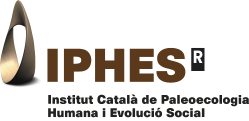Excelencia María de Maeztu
The Institut Català de Paleoecologia Humana i Evolució Social (IPHES-CERCA) has been awarded the Maria de Maeztu Unit of Excellence (CEX2019-000945-M) for the period between 2020 and 2023. This is a distinction given by the Spanish Ministry of Science. The objective is to fund public research centres and units, in any scientific area, that demonstrate scientific impact and leadership at an international level and that actively collaborate with their social and economic environment.
The IPHES’ vocation has always been excellence in research for the scientific education of society, in our case, concerning human adaptations to changing climates and landscapes, their response to subsistence requirements, and their cognitive and technical behaviour through time to solve new challenges.
In essence, IPHES seeks to diffuse and socialize knowledge, to contribute to forming a well-informed, critical and responsible society. We have acquired expertise in many disciplines related with the past: from the acquisition of empirical data (fieldwork and archaeological record management), to laboratory analysis, experimental studies, and Prehistoric reconstructions. This mass of data provides us with a solid foundation from which to address the central international debates in human evolution.
The IPHES’ excellence in reconstructing natural and cultural landscapes of the past is achieved through consolidated research in two spheres: 1) disciplines related to the reconstruction and interpretation of the Pleistocene and Holocene records (Zooarchaeology, Taphonomy, Technology, Cognition, Archaeobotany, Ethology, Palaeoanthropology, Geoarchaeology and Palaeoenvironment); 2) disciplines involved in data acquisition, management and analyses (excavations in a large number of Quaternary sites, conservation, archaeological data management, microscopy, geochemistry, and large equipment).
Currently, our research leads us to a series of top-topics in the international debate on human evolution, which cannot be answered from traditional multi- and interdisciplinary perspectives (see “Research Objectives”).
In the frame of the Maria de Maeztu programme, IPHES aims to implement a new organizational chart to better accomplish excellent research and management and reinforce cooperation and leadership. This is crucial in areas of academic and scientific training, since students in archaeology must make an early commitment to a core discipline to start and develop their careers. The main body of the IPHES is formed by expert researchers working in different Research Units capable of functioning in multi-, inter- and transdisciplinary ways through their Research Groups. The relationship between the disciplinary Unit and the interdisciplinary Research Groups is one of the strengths of the team that we must maintain and reinforce.
Currently, all of our efforts must go into consolidating the technician Unit’s staff and to increase the researcher’s staff, a pivotal issue for the IPHES production. In this sense, the conversion of the IPHES into a María de Maeztu Unit helps to open new postdoctoral research positions and consolidate the technician contracts. Working conditions for the IPHES researchers should be improved in order to attract new national and international talent.
Academic environment will continue to have an important role for institutional improvement since researchers participate in different graduate and postgraduate programs at the URV, in association with other national and international universities. Masters and doctoral studies involve students from outside of the EU, all guaranteed scientific support and mentoring by senior and postdoctoral permanent researchers.
Moreover, the IPHES is engaged in achieving gender balance working to support female researchers to consolidate their careers and facilitate their project applications allowing them to acquire leadership roles.
Goals to consolidate our international position will focused on strengthening specific areas:
a) Fieldwork projects in Spain and abroad (we aim to reinforce our current leadership of Spanish and foreign excavations)
b) Collaborations with international Research Groups and Centres
c) Participating in new international consortia from ERA and abroad
d) Participating in top scientific societies and forums
e) Two international workshops planned within the María de Maeztu.
In terms of knowledge transfer, the strategies and activities planned are:
- To consolidate and strengthen ongoing activities related to the Cultural Heritage enhancement of archaeo-paleontological sites (Camp dels Ninots and Barranc de la Boella, Catalonia)
- To transfer the knowledge between fieldwork, research, and development of heritage abroad. During 2020-2023, we will build up an average of 3 international archaeological projects: one in Danakil (Eritrea), another in eastern Morocco; and the third in the Southern Caucasus. These projects are developing collaborations with local authorities through memoranda of understanding
- Developing the alignment of our strategic areas of research with local stakeholders to boost the creation of products related to cultural heritage, social and economic development, in line with our successes in recent years. The final goal is to increase the network of interested parties from other sectors, and to strengthen our role as a world-class institution in our field.

